Hay Festival Querétaro 2023
Welcome to the Hay Festival Querétaro 2023 programme. The festival took place from 7 to 10 September, with 105 activities with 151 international guests from 20 countries, and with Hay Joven, Hay Festivalito, Hay Delegaciones and Talento Editorial events, as well as two activities in Cadereyta.
Event HJ1
Brenda Lozano in conversation with María Concepción Castillo González and Mariana Oliveros Trujillo
Tec de Monterrey, Pabellón Tec
Read moreBrenda Lozano (Mexico) is a fiction writer, essayist and publisher. In 2017 she featured on the Bogotá39 list as one of the best Latin American fiction writers under the age of 40. She is the author of the novels Todo nada (2009), Loop (2019), Witches (2022) and the recent Soñar como sueñan los árboles (2024), which tells the story of two women whose lives cross after the kidnapping of a girl, in the Mexico City of the 1940s; this is a story full of suspense, but also of humour, which portrays a period of splendour for the capital and Mexican culture. It also focuses on matters of contemporary interest, such as motherhood, and women’s place in society. In conversation with María Concepción Castillo González and Mariana Oliveros Trujillo.
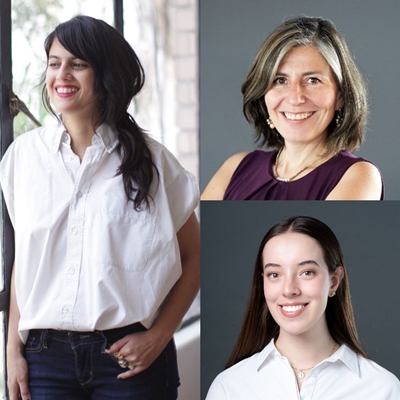
Event HC1
Ernesto Galán in conversation with Elisa Guerra
COBAQ 9
Read moreErnesto Galán has degrees in Performing Arts and Law. He is the Artistic Director of La Miscelánea Teatro company and has written and directed a range of plays. He is also the manager of a reading space for child workers, and creator of the La Bodega forum and the La Miscelánea Escénica theatre festival. In this conversation with Elisa Guerra he will discuss the subject of drama based on his experience with children and young people.
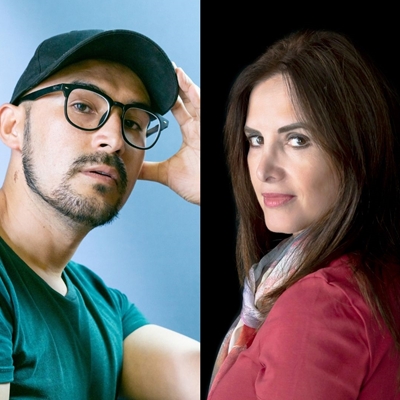
Event HJ2
BBC Mundo workshop with Andrea Díaz Cardona, Daniel Pardo and José María Rodero
Auditorio Fernando Díaz Ramírez de la UAQ
Read more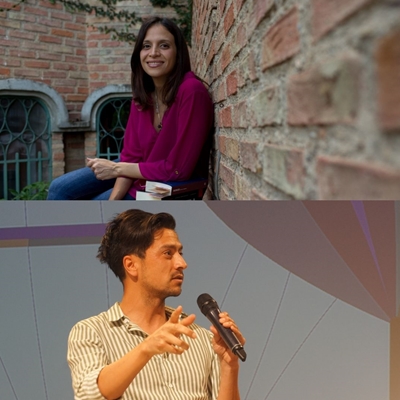
Event HJ3
Henry Marsh in conversation with José Luis Copado Gutiérrez
Universidad Anáhuac, Aula Magna Edificio C
Read moreHenry Marsh is a renowned British writer and retired neurosurgeon. He is the author of, among other books, And Finally. Matters of Life and Death, which tells of his own experience as a cancer patient. At this event he will talk about the principles and goals of palliative care, and about the challenges and opportunities that currently exist in terms of a dignified death, offering advice and recommendations to help patients and their loved ones face this difficult stage of life with dignity and compassion. In conversation with José Luis Copado Gutiérrez.
In English
With the support of British Council
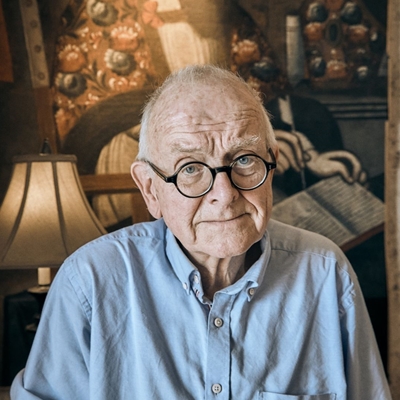
Event HJ4
Angela Saini in conversation with Eduardo Becerra
UNAM ENES
Read moreAngela Saini is a British scientific journalist and radio presenter, as well as a writer whose work has been acclaimed and translated into 14 languages. Her penultimate book, Superior: The Return of Race Science, was shortlisted for the Los Angeles Times Book Prize and named Book of the Year by Nature, the Financial Times and the NPR programme Science Friday. On this occasion she presents The Patriarchs, an audacious, radical book that unearths the roots and history of how this system of domination arose for the first time in societies and spread around the world, from prehistory to the present. Saini offers a hopeful narrative bringing to bear the many possible human agreements that question the old stories of inevitable male supremacy, and reveals that these stories are an element that is constantly changing within systems of control. She will talk to Eduardo Becerra.
Event in English
With the support of the British Council
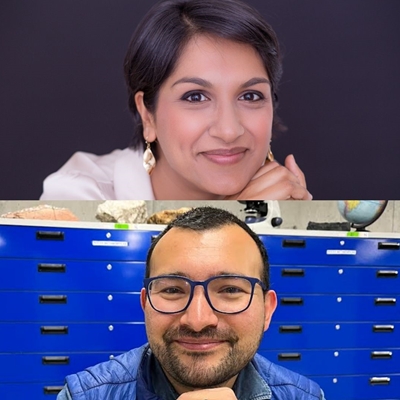
Event HJ5
Guiomar Rovira and Rosaluz Pérez Espinosa in conversation with Kevyn Simón Delgado
South to south conversations: Thirty years of the Zapatista movement
Aula Forense en la Facultad de Derecho
Read moreWith the support of Open Society Foundations and Acción Cultural Española, AC/E
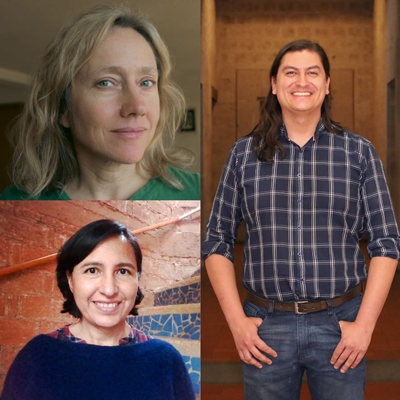
Event HC2
Andrés Cota Hiriart
La Solana
Read moreAndrés Cota Hiriart is a biologist, zoologist and writer. He has written books including Cabeza ajena, Faunologías, El ajolote. Biología del anfibio más sobresaliente del mundo and Fieras familiares, and has come close to all kinds of animals in their natural habitats, travelling to some amazing places around the world, like the Galapagos, Borneo, Sulawesi and the island of Guadalupe. At this event, Cota will focus on a wonderful creature from his native Mexico: he will start out with the iconic axolotl and move onto the ajolote of Queretaro state, which is not so commonly mentioned. During the event, he will share images and excerpts from his books.
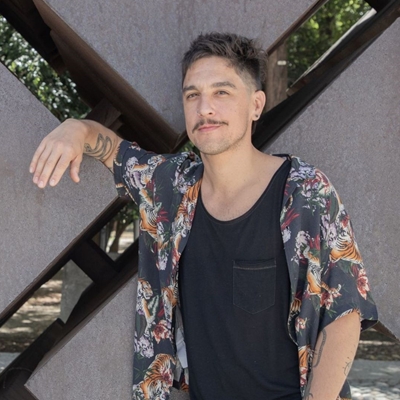
Event 1
Neige Sinno in conversation with Elvira Liceaga
Teatro de la Ciudad
Read moreThe French author Neige Sinno has recently published her book Triste tigre in Spanish. This is a work that has startled the world of publishing. The book, which won the 2023 Fémina Proze, takes a precise and pitiless look at the monstrous and taboo theme of incest, which the author tackles based on her own experience, discovering it to be a crime that affects both family and society, which lives among truths and lies, and is linked to consent and the desire for power, and whose consequences are far-reaching in the lives of victims. It is also a book that speaks about the role of language and literature as safe spaces, which allow a freedom of thought. In conversation with Elvira Liceaga.
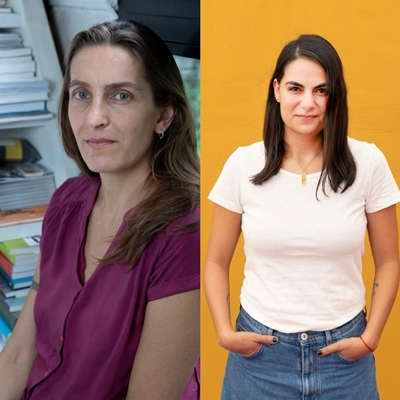
Event 2
Los buscadores de migrantes perdidos en el desierto de Sonora
José María Rodero and Alberto Ortega with Daniel Pardo
Cineteca Rosalío Solano
Read moreAccording to the International Organization for Migration, hundreds of migrants disappear and die each year in the Sonoran Desert between Arizona and California; this makes it the most dangerous overland migration route in the world. A brave group of people, known as the Desert Eagles, dedicate their weekends to looking for migrants lost in this hostile territory, where temperatures can reach 50ºC and dehydration is the main cause of death. José María Rodero, from BBC Mundo, accompanies members of this team on one of their expeditions, in which they hope to rescue people before they perish, something that is not always possible. One of the members of the Eagles, Alberto Ortega, will be present. In conversation with Daniel Pardo, BBC Mundo journalist.
Duration of the documentary: 22 minutes
Co-organized with BBC Mundo
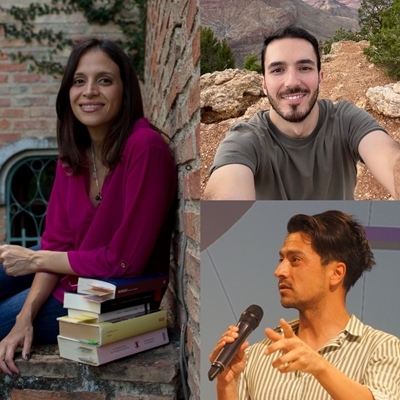
Event 3
Vasilisa Stepanenko in conversation with Daniel Pardo
Hay Festival & Lviv Bookforum series: 20 Days in Mariupol
Teatro de la Ciudad
Read moreThe Ukrainian Vasilisa Stepanenko, in conversation with the BBC Mundo journalist Daniel Pardo, will talk about 20 Days in Mariupol, a documentary project, co-produced by her, which won an Oscar in 2024. This award-winning work offers a detailed look at the siege which the city experienced, capturing the impact on the population and the devastation caused by the conflict in eastern Ukraine. This is a valuable testimony to the impact of the war on the civilian population, and the resistance of the Ukrainian people.
Simultaneous interpretation from English to Spanish available
With the support of Open Society Foundations

Event 4
Screening of short films by Brenda Vanegas, Comfrey Films and Joel Zito Araújo
Film with a message
Cineteca Rosalío Solano
Read moreJoie Lou Shakur from Comfrey Films (United States), a production company whose goal is to empower black people who identify as transgender, gender nonconforming or intersex, offering them training and support as they launch a career in independent filmmaking; and with Joel Zito Araújo (Brazil), a Brazilian filmmaker, researcher and academic, acclaimed for his work in documentary cinema and in the representation of the Afro-descendent population of Brazil. They will talk to the actress and director Claudia Sainte-Luce.
With the support of the Ford Foundation
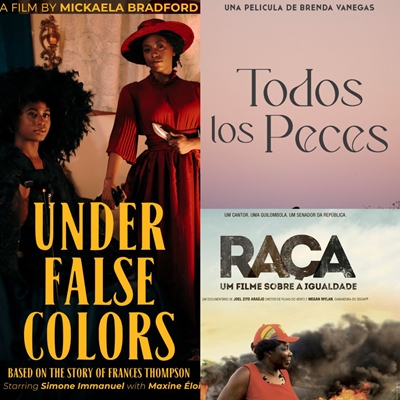
Event 5
The state of Querétaro Philharmonic Orchestra and the pianist Marcela Roggeri in concert
Hay Festival & Lviv BookForum series
Teatro de la Ciudad
Read moreWith the support of Open Society Foundations

Event 6
Mukí sopalírili aligué gawichí nirúgame
Screening of the documentary followed by a discussion with Ángeles Cruz, Santiago Esteinou and Adrián Moreno
Cineteca Rosalío Solano
Read moreOn the International Day of the Indigenous Woman, we present the documentary Mukí sopalírili aligué gawichí nirúgame (“The Woman of Stars and Mountains”), about the heartbreaking, incredible story of the Raramuri woman Rita Patiño, from Chihuahua. Rita left her community in the Tarahumara mountains and walked all the way to Kansas, where she was interned in a psychiatric hospital against her will, since the hospital authorities were unable to determine who she was, where she came from and what language she spoke.
Directed by Santiago Esteinou
Duration: 100 min
Screening of the documentary followed by a discussion with Ángeles Cruz (Actress), Santiago Esteinou (Director) and Adrián Moreno (Linguist).
With the support of UNESCO
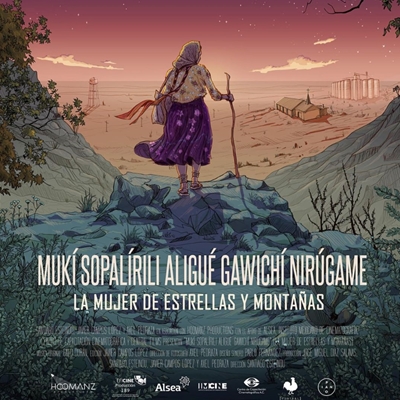
Event HJ6
Naief Yehya in conversation with Abel Martínez Hernández
Planet of mushrooms
Biblioteca Campus Centro Histórico - Dirección General de Bibliotecas UAQ
Read moreNaief Yehya (Mexico) is an industrial engineer, fiction writer, essayist and cultural critic. The author a various novels and works of non-fiction, his work has been translated into Italian, English, Arabic and French. He contributes regularly to the Mexican newspaper La Razón. El planeta de los hongos is a cultural and social history of mushrooms, particularly hallucinogenics, and LSD. His approach is not only scientific, but also based on experience and literary non-fiction. Not quite a manual for consumption or a guide for collectors, this is an exploration of the relationship between “magic” mushrooms and humanity, and their potential to open the mind. In conversation with Abel Martínez Hernández.
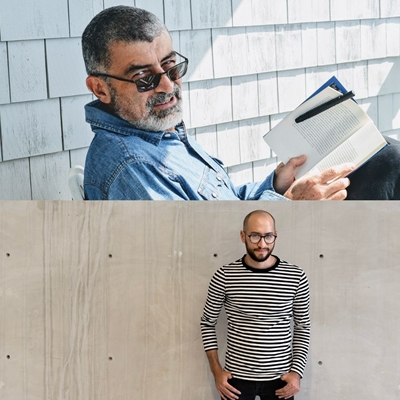
Event HC3
Workshop with Paulina Suárez
Create your own monsters
LEO A.C.
Read moreThe Mexican artist Paulina Suárez studied Illustration at the Academy of Art University in San Francisco, California, where she lived between 2008 and 2013. She is currently based in Mexico, where she works as a freelance artist and art educator. Her illustrations have appeared in work for different publications and publishers, including Editions FLBLB, Cacciani, FCAS, Esto es un libro, Revista Marvin, Cartelera CCUT Tlatelolco, Far Faria, as well as for the Coco Lab, Llamarada and Los Hijos de Jack animation studios. At this workshop, participants will have the chance to use stickers to create their own monsters, and then to colour and decorate them.
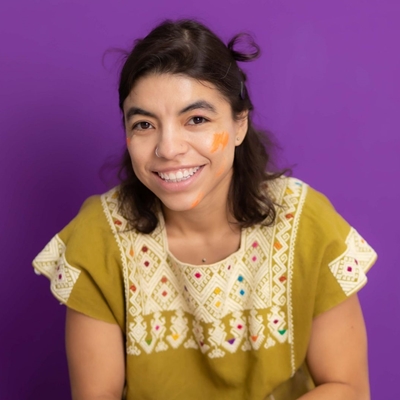
Event HJ7
Mohamed El Morabet in conversation with Saúl Crespo and Rogelio Haces Gil Martínez
Tec de Monterrey, Pabellón Tec
Read moreMohamed El Morabet (Morocco/Spain), a Politics graduate, presents his second novel, El invierno de los jilgueros, a story about Brahim, who has lived with death, illness and war from a young age. Years later, Brahim studies Fine Art and meets Olga, a woman immersed in her role as an art teacher, but who also wants to see new horizons, other realities. The link created between teacher and pupil will change their lives forever. In conversation with Saúl Crespo and Rogelio Haces Gil Martínez.
With the support of Acción Cultural Española, AC/E
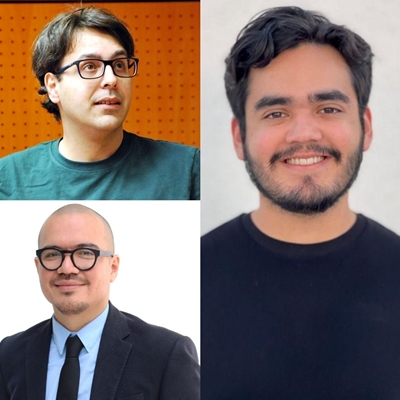
Event HJ8
Sara Barquinero in conversation with Julieta Díaz Barrón and Montserrat Michelle Rivera Ruiz
Tec de Monterrey, Pabellón Tec
Read moreThe writer, essayist, and thinker Sara Barquinero (Spain)has published one of the most acclaimed novels of the year in her country, Los Escorpiones (2024),where the two main characters investigate a dangerous conspiracy spanning several decades and reflect on the meaning of life. A PhD in Philosophy, Barquinero received a creative scholarship at the Residencia de Estudiantes in Madrid and has obtained numerous prizes, such as the Virginia Woolf Short Story Prize in the English Language (2017) and the Voces Nuevas Poetry Prize of the Torremozas Publishing House in 2019. In conversation with Julieta Díaz Barrón and Montserrat Michelle Rivera Ruiz.
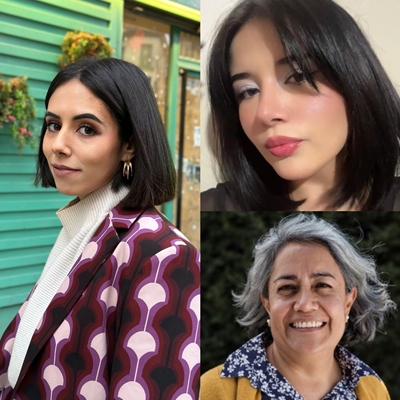
Event HJ9
Antonio Ortuño in conversation with Abdiel Hernández
UNAM ENES
Read moreAntonio Ortuño is a major voice in Mexican contemporary literature, and his fascinating body of work challenges conventions in forms of exploring social and political matters. In conversation with Abdiel Hernández, Ortuño will talk about his novels, which tackle themes such as violence and corruption, satire of the corporate world, the migration routes of Central America, and dystopian perspectives on his country. Ortuño will also talk about the project Verdades compartidas, an anthology which, thanks to the Hay Festival and the Colombian International Centre for Transitional Justice, reimagines and tells the story of Colombia after the peace process, through the writings of ten Latin American figures.
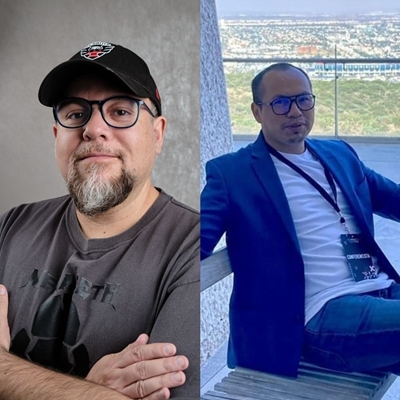
Event HJ10
Garry Gottfriedson in conversation with Ingrid Bejerman and Luz María Lepe
Decolonising verse: challenges for the literary translation of native poetry
Biblioteca Campus Centro Histórico - Dirección General de Bibliotecas UAQ
Read moreBased on the challenges of taking the verse of Garry Gottfriedson (Canada) from English into Spanish for Tierra y lenguaje, a collection of some of his most representative work, we present a conversation with the Secwépecm poet and the indigenous literature specialist about the attention and care needed to translate poetry by native authors from one colonial language into another, moderated by Luz María Lepe and the journalist and educator Ingrid Bejerman.
With the support of Blue Metropolis/Metropolis bleu, the literary festival of Montreal

Event TE1
Noé Morales and Manuel Naredo in conversation with Imanol Martínez
Remembering Gerardo Mancebo del Castillo
Museo de la Ciudad (espacio Hay Festival)
Read moreLetra Capital, the Queretaro Municipality press, has recently compiled the complete works of the Queretaro dramatist Gerardo Mancebo del Castillo, whose innovative and original plays have made him a central figure in Mexican theatre. Noé Morales and Manuel Naredo will talk about his Obras completas with Imanol Martínez.
Co-organized with Cálamo and AECID
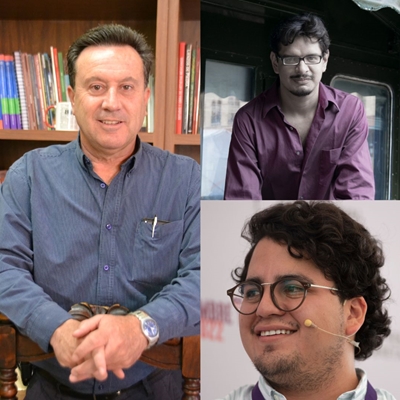
Event HJ11
Israel Nieves in conversation with Rebecca Ivonne Ruiz Padilla
Community is culture
Auditorio de la Facultad de Artes UAQ
Read moreThe cultural activities that arise from community ties feed back into a strengthening of these communities, creating a positive impact on their inhabitants and facilitating the work of creators and artists. At this event, we will find out about an artistic community project from Queretaro, which can help to create a route map for initiatives that have such positive effects on our communities. Israel Nieves from La Otra Banda (Mexico) talks to Rebecca Ivonne Ruiz Padilla.
Co-organized with CAF
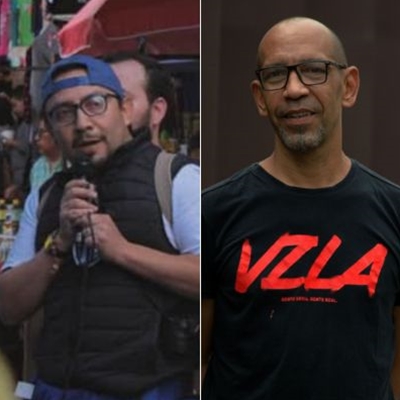
Event HJ12
Amalia Andrade in conversation with Perla Holguín
Universidad Anáhuac, Aula Magna Edificio C
Read moreAmalia Andrade, the Colombian author of works such as Uno siempre cambia al amor de su vida (Por otro amor o por otra vida) and Cosas que piensas cuando te muerdes las uñas, has sold over a million books and is a social media phenomenon. In her most recent book, No sé cómo mostrar dónde me duele, Andrade returns to the theme of mental health and the body-mind relationship, writing about matters such as poetry, music and the cultivation of good habits to work on our emotional education and balance the internal world of the feelings. In conversation with Perla Holguín.
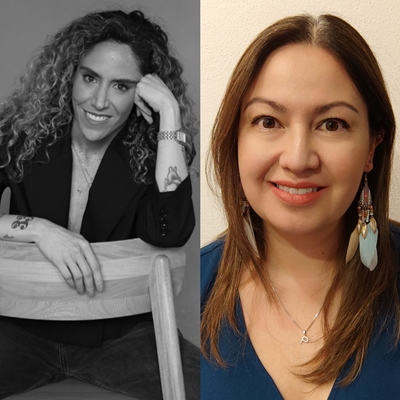
Event HJ13
Rebecca Solnit in conversation with Iliana Padilla
UNAM ENES
Read moreThe writer, historian and activist Rebecca Solnit is an important voice when it comes to matters such as feminism, environmental and urban history, popular power, social change and insurrection, walking and wandering, hope and catastrophe. She is the author of over 25 books, including the anthology she co-edited in 2023, Not Too Late: Changing the Climate Story from Despair to Possibility, as well as Orwell’s Roses, Hope in the Dark, Men Explain Things to Me, A Paradise Built in Hell and A Field Guide to Getting Lost. She writes regularly for The Guardian and is on the board of the climate group Oil Change International. In conversation with Iliana Padilla.
Event in English
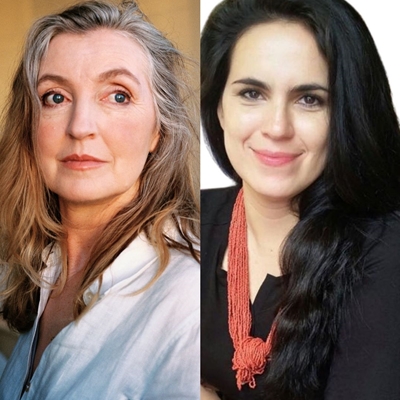
Event HJ14
César Rendueles in conversation with Michel Morales
Centro Cultural Aurelio Olvera Montaño UAQ
Read moreThe Spanish thinker and writer César Rendueles presents his work Comuntopía: Comunes, postcapitalismo y transición ecosocial. Rendueles, recognised for his social analyses and critical thinking, describes our current situation of urgency, characterised by ecological, political and technological crises, and goes further to advocate the importance of “common goods”, collaborative systems that manage resources (such as public goods and services), which are growing more scarce for millions of people. His book offers a hopeful message, proposing a global "politics of the commons", aimed at social forces that seek democratic, progressive and emancipatory strategies in the context of post-capitalism. In conversation with Michel Morales.
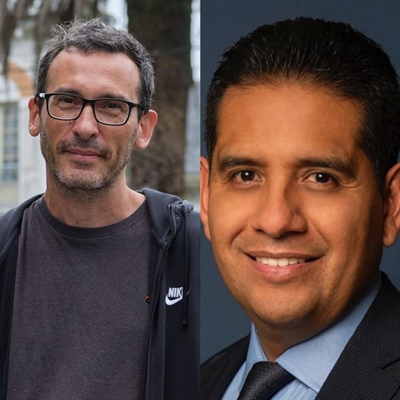
Event TE2
Rosa Beltrán, Sara Uribe and Socorro Venegas
Letters to Ricardo
Museo de la Ciudad (espacio Hay Festival)
Read moreCo-organized with UNAM, Cálamo and AECID

Event HC6
Frida Martínez in conversation with Kenya Acosta
Biblioteca Juan de Dios Bátiz Paredes. Delegación Josefa Vergara
Read moreWhat do you have to do to win an Olympic medal or play at a football World Cup? In her book Súper-deportistas mexicanos, Frida Martínez portrays 24 high-achieving Mexican sportspeople. Her book reveals the hard work, discipline and dedication of her chosen protagonists, who train in karate, gymnastics, athletics, baseball and more, until they reach the top of their sport. In conversation with Kenya Acosta, Frida Martínez tells us these stories, which show how high we can fly as long as we have imagination, consistency and effort.
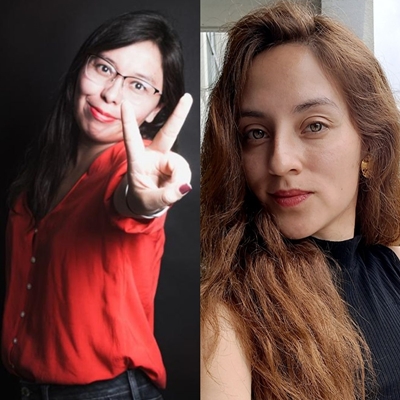
Event HC7
Workshop with Tere Alcántara
Parque de la Mantarraya
Read moreThe radio is a medium whose importance cannot be overemphasised. From its beginnings, it has worked to communicate, inform and entertain. Today we have other media that serve similar functions, but it is of interest to know more about the radio, to understand what it can do, what it can contribute. At this event, Tere Alcántara will talk about the radio, sharing with the children curious anecdotes and information. Work will be done on breathing, diction and intention and, to finish, teams will create a radio programme, in which participants can present their work, as if they were broadcasting a real radio programme.
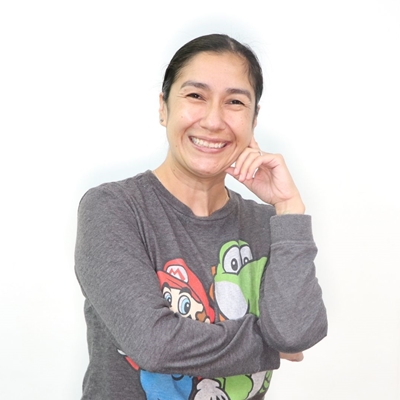
Event HC8
Paola Llamas Dinero in conversation with Yudi Martínez
Poems for otakus
La Otra Bandita
Read moreDivided into five sections, with an opening and an ending in the anime tradition, the poems of Paola Llamas Dinero explore the sensations that occur when fiction forms an essential part of our lives. Through language based on words, images and signs, characteristic of the street, television and Internet, the author examines our relationship with the world of fiction through anime, manga and the social media. She will ask how imaginary worlds determine many of our feelings and identities. She also wonders, if we are constantly relating to characters who do not exist, watching a series or scrolling through stories on Instagram, whether we can really form links with other people. In conversation with Yudi Martínez.
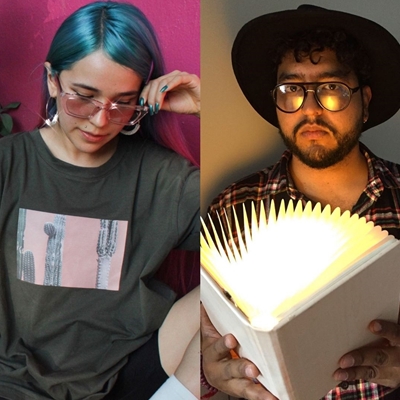
Event HC9
Ekaterina Álvarez in conversation with Elisa Guerra
Centro Cultural Comunitario Epigmenio González
Read moreEkaterina Álvarez was born in Moscow and lives in Prague. She is the publisher and author of her first children’s book, ¿Dónde está Arte?. In this entertaining work, the writer takes us on a trip through some of Mexico City’s main museums (from the Anthropological Museum, to the University Museum of Contemporary Art, via Chapultepec Castle and the Museum of Modern Art) in search of the Treasure of the Bones, together with little Otta and her dog Artemio. However, in the blink of an eye, Arte gets lost, and we go together with Otta to find him. In conversation with Elisa Guerra.
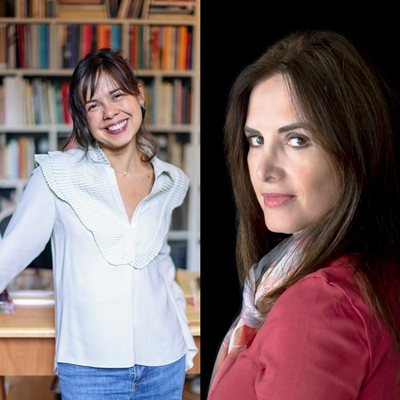
Event HJ16
Nimmi Gowrinathan in conversation with Carla Alicia Suárez Félix
Biblioteca Campus Centro Histórico - Dirección General de Bibliotecas UAQ
Read moreNimmi Gowrinathan (Sri Lanka/United States) is a thinker, academic and activist, and author of Radicalizing Her. Why Women Choose Violence, a fascinating study of women active in guerrilla movements, including the FARC (Colombia), the Tamil Tigers (Sri Lanka), the Syrians who have fought against the Asad government, the EZLN in Mexico and the PLO in Palestine. The book dismantles beliefs about gender and analyses the many reasons that lead these women to armed struggle. Gowrinathwan is a professor at City College in New York, where she has founded the Politics of Sexual Violence initiative, and works regularly with media outlets such as CNN, MSNBC, Al Jazeera and the BBC. In conversation with Carla Alicia Suárez Félix.
Event in English
With the support of Open Society Foundations
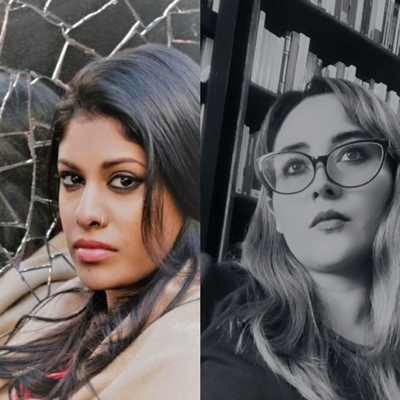
Event 7
Rosaluz Pérez Espinosa and Guiomar Rovira in conversation with Yásnaya Elena Aguilar Gil
South to south conversations: thirty years of the Zapatista movement
Teatro de la Ciudad
Read more2024 is the thirtieth anniversary of one the most important revolutionary uprisings of the last half century, one that resonated internationally and which continues to inspire emancipatory movements around the world. The Zapatista movement, with its egalitarian, community organization, its advocacy of traditional knowledge, and its impressive capacity for communication (it was one of the first resistance movements to use the Internet to publicise its ideas), offers us a living alternative to raw capitalism. At this event, Rosaluz Pérez Espinosa, who has studied at first hand the role of women in the construction of the Zapatista political project; and Guiomar Rovira (Spain), journalist, writer and author of Zapata vive, will talk to Yásnaya Elena Aguilar Gil.
With the support of Open Society Foundations and Acción Cultural Española, AC/E
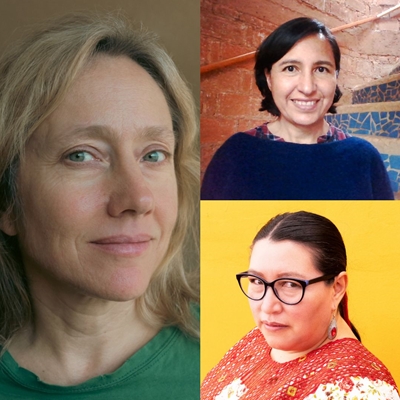
Event 8
Alberto Fuguet in conversation with Eliezer Budasoff
Cineteca Rosalío Solano
Read moreAlberto Fuguet (Chile), author, journalist and filmmaker, is an outstanding representative of the New Chilean Fiction movement of the 1990s. His new novel, Ciertos chicos, takes us back to the 1980s, and life under the Chilean dictatorship, exploring a world that challenges political structures and cultural binaries. The book, about young LGTB love, takes us into a vibrant counterculture scene, full of the music, books, fanzines and journalism that have come to represent the period, offering us a luminous counterpoint and a personal memoire from the viewpoint and experiences of the author. In conversation with Eliezer Budasoff.
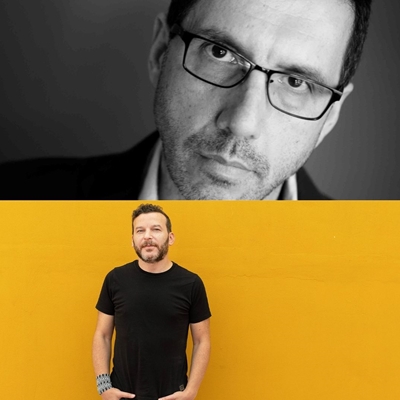
Principal Sponsor
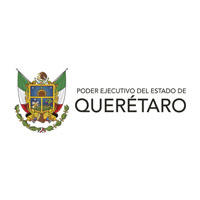

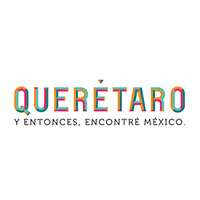
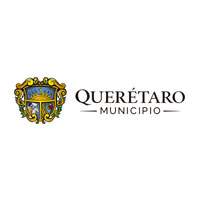
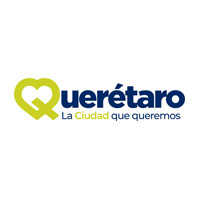
Partner for Latin America

